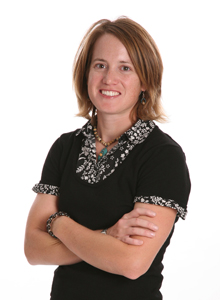 Amy Cerato ’99 is among 100 recipients nationwide of the Presidential Early Career Award for Scientists and Engineers (PECASE) from President Obama, the highest honor bestowed by the U.S. government on outstanding scientists and engineers starting their independent careers.
Amy Cerato ’99 is among 100 recipients nationwide of the Presidential Early Career Award for Scientists and Engineers (PECASE) from President Obama, the highest honor bestowed by the U.S. government on outstanding scientists and engineers starting their independent careers.
“These extraordinarily gifted young scientists and engineers represent the best in our country,” President Obama said. “With their talent, creativity, and dedication, I am confident that they will lead their fields in new breakthroughs and discoveries and help us use science and technology to lift up our nation and our world.”
An assistant professor of civil engineering at the University of Oklahoma, Cerato is studying how to design and build robust foundations for critical infrastructures, particularly in marginal soils. She says the U.S. spends $15 billion a year repairing infrastructure built on expansive soil, which exceeds what is spent annually on damage caused by floods, hurricanes, earthquakes, and tornados combined. Expansive soils are frequently overlooked as a major problem because they often take years to cause extensive damage.
“Receiving the PECASE Award is the highlight of my career,” said Cerato, a civil engineering graduate who earned a Ph.D. in geotechnical engineering and master’s degrees in geology and civil engineering at the University of Massachusetts-Amherst. “I am ecstatic.”
She mentored Rachael Oleski ’06 in testing soil from landslides during a National Science Foundation-sponsored Research Experience for Undergraduates (REU) at the University of Oklahoma. They concluded that the landslides were due to an overly steep slope and the soil’s high carbonate content. Cerato maintained contact with Oleski as the senior pursued the topic further in a yearlong honors thesis.
Cerato believes she benefitted greatly from Lafayette’s combination of engineering and liberal arts in an intimate campus setting.
“A liberal arts education helped immensely with public speaking and written communication skills,” she says. “The small and diverse civil engineering class I graduated with gave me the chance to receive extensive feedback on my technical writing and technical communication deliverables for my courses. I feel that the speaking and writing skills honed at Lafayette College were very helpful in graduate school, when the technical content became more difficult and specific.”
Cerato was among 13 women graduating in a class of 23 civil engineering majors. Lafayette is among the national leaders in the percentage of engineering degrees earned by women, according to the the American Society for Engineering Education.Cerato took advantage of many opportunities inside and outside the classroom for engineering majors and other Lafayette students. She studied abroad in Brussels for a semester, where her courses included an engineering class taught by Baird Professor of Mechanical Engineering Leonard Van Gulick via video teleconferencing, and took advantage of a “once-in-a-lifetime opportunity,” a January interim course in Kenya and Tanzania led by Rex Ahene, professor of economics and business, and Roger Ruggles, associate professor and head of civil engineering. She served a three-day externship with Robert T. Doble ’69 at the Pennsylvania Department of Transportation, where she studied bridge design and participated in on-site construction inspection of the Lackawanna Valley Industrial Highway as well as bridge inspection.
She also competed on Lafayette’s Division I women’s golf team, founded, directed, and performed in the pep band, played in the jazz ensemble and College Theater pit band, and was a member of Society of Women Engineers and the Delta Delta Delta sorority, “which helped me learn how to work together with an assortment of different people for a common goal,” she says.
“I gained a solid base knowledge of civil engineering at Lafayette, and more importantly, the ability to think critically,” says Cerato. “I’m thankful for my personalized, well-rounded, undergraduate education.”
